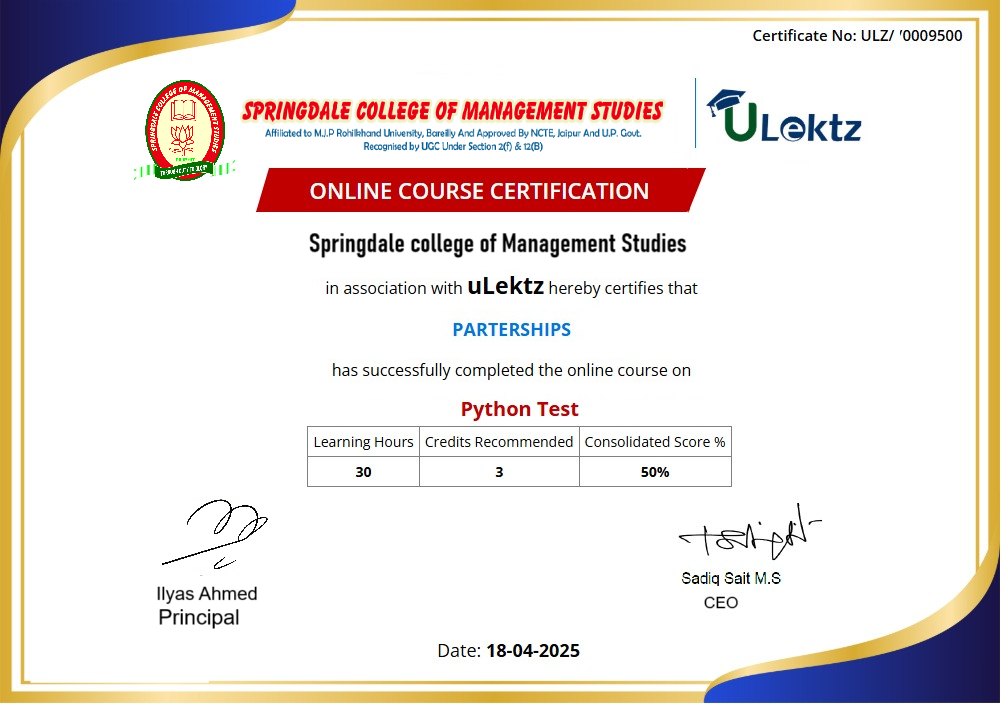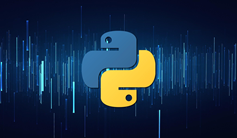

Note: Please check your Spam or Junk folder, in case you didn't receive the email with verification code.
Non-Linear: Random Order
A Python course aims to:
Equip students with the ability to write efficient and effective Python code.
Introduce fundamental programming concepts and problem-solving techniques.
Develop an understanding of Python's standard libraries and frameworks.
Provide hands-on experience through projects and practical applications.
By the end of the course, students will be able to:
Understand Python syntax and semantics.
Write and debug Python programs.
Utilize Python for data manipulation and analysis.
Implement object-oriented programming concepts in Python.
Use Python libraries for web development, data science, and automation.
The course enhances various skills, including:
Programming Proficiency: Writing clean and efficient code.
Problem-Solving: Developing logical thinking and troubleshooting abilities.
Data Handling: Manipulating and analyzing data using Python libraries.
Web Development: Building web applications with frameworks like Django and Flask.
Automation: Automating tasks and workflows with Python.
Machine Learning: Using Python libraries like TensorFlow and Scikit-learn for AI and machine learning projects.
Knowledge of Python opens up numerous career opportunities, such as:
Software Developer: Building applications and software solutions.
Data Scientist: Analyzing and interpreting complex data sets.
Machine Learning Engineer: Developing and deploying machine learning models.
Web Developer: Creating dynamic and interactive websites.
Automation Engineer: Designing and implementing automated solutions.
DevOps Engineer: Managing and automating infrastructure using Python scripts.
 Overview of Python and its applications
Overview of Python and its applications
 Installing Python and setting up the development
Installing Python and setting up the development
 Using Python interactive shell and IDEs
Using Python interactive shell and IDEs
 Unit 1 Test
5 Questions
Unit 1 Test
5 Questions
 Variables and data types
Variables and data types
 Basic operators and expressions
Basic operators and expressions
 Input and output operations
Input and output operations
 Comments and code formatting
Comments and code formatting
 For Reference: How to go about programming?
Duration:
For Reference: How to go about programming?
Duration:
 Unit 2 Test
5 Questions
Unit 2 Test
5 Questions
 Conditional statements
Conditional statements
 Loops
Loops
 Break, continue, and pass statements
Break, continue, and pass statements
 List comprehension
List comprehension
 For Reference: Introduction to SCRATCH
Duration:
For Reference: Introduction to SCRATCH
Duration:
 Unit 3 Test
5 Questions
Unit 3 Test
5 Questions
 Defining and calling functions
Defining and calling functions
 Function arguments and return values
Function arguments and return values
 Lambda functions
Lambda functions
 Creating and importing modules
Creating and importing modules
 For Reference: Loops
Duration:
For Reference: Loops
Duration:
 Unit 4 Test
5 Questions
Unit 4 Test
5 Questions
 Lists and list operations
Lists and list operations
 Tuples and sets
Tuples and sets
 Dictionaries and their methods
Dictionaries and their methods
 Strings and string manipulation
Strings and string manipulation
 For Reference: Solution to Looping
Duration:
For Reference: Solution to Looping
Duration:
 Unit 5
5 Questions
Unit 5
5 Questions
 Reading from and writing to files
Reading from and writing to files
 Working with CSV and JSON files
Working with CSV and JSON files
 Try-except blocks for error handling
Try-except blocks for error handling
 Raising and handling exceptions
Raising and handling exceptions
 For Reference: Installation of Anaconda
Duration:
For Reference: Installation of Anaconda
Duration:
 Unit 6
5 Questions
Unit 6
5 Questions
 Classes and objects
Classes and objects
 Inheritance and polymorphism
Inheritance and polymorphism
 Encapsulation and abstraction
Encapsulation and abstraction
 Magic methods and operator overloading
Magic methods and operator overloading
 For Reference: Executing a sequence of instructions in the Console
Duration:
For Reference: Executing a sequence of instructions in the Console
Duration:
 Unit7
5 Questions
Unit7
5 Questions
 Introduction to pip and package management
Introduction to pip and package management
 Overview of standard library modules
Overview of standard library modules
 Working with date and time
Working with date and time
 Regular expressions with re module
Regular expressions with re module
 For Reference: Motivation to if condition
Duration:
For Reference: Motivation to if condition
Duration:
 Unit 8 test
5 Questions
Unit 8 test
5 Questions
 Introduction to NumPy for numerical computing
Introduction to NumPy for numerical computing
 Pandas for data analysis
Pandas for data analysis
 Basic data visualization with Matplotlib
Basic data visualization with Matplotlib
 For Reference: Importance of Syntax
Duration:
For Reference: Importance of Syntax
Duration:
 Unit 9 test
5 Questions
Unit 9 test
5 Questions
 Introduction to web frameworks
Introduction to web frameworks
 Creating a simple web application
Creating a simple web application
 Handling HTTP requests and responses
Handling HTTP requests and responses
 For Reference: Introduction to While loop
Duration:
For Reference: Introduction to While loop
Duration:
 Unit 10 Test
5 Questions
Unit 10 Test
5 Questions
 Writing scripts for system administration tasks
Writing scripts for system administration tasks
 Automating file operations
Automating file operations
 Web scraping basics with Beautiful Soup
Web scraping basics with Beautiful Soup
 For Reference: Manipulation
Duration:
For Reference: Manipulation
Duration:
 Unit 11
5 Questions
Unit 11
5 Questions
 PEP 8 style guide
PEP 8 style guide
 Code organization and documentation
Code organization and documentation
 Performance optimization techniques
Performance optimization techniques
 Debugging tools and techniques
Debugging tools and techniques
 For Reference: Operations
Duration:
For Reference: Operations
Duration:
 Unit 12
5 Questions
Unit 12
5 Questions
 Basic Git commands
Basic Git commands
 Creating and managing repositories
Creating and managing repositories
 Collaborating with others using Git
Collaborating with others using Git
 For Reference: Program and Play
Duration:
For Reference: Program and Play
Duration:
 Unit 13
5 Questions
Unit 13
5 Questions
 Unit testing with unittest framework
Unit testing with unittest framework
 Writing and running test case
Writing and running test case
 Test-driven development concepts
Test-driven development concepts
 For Reference: Unit Testing Your Code
Duration:
For Reference: Unit Testing Your Code
Duration:
 Unit 14
5 Questions
Unit 14
5 Questions
 Final Assessment
15 Questions
Final Assessment
15 Questions
The certificate issued for the Course will have
Only the e-certificate will be made available. No Hard copies. The certificates issued by S. can be e-verifiable at www.ulektzskills.com/verify.



 90 hours Learning Content
90 hours Learning Content 100% online Courses
100% online Courses English Language
English Language Certifications
Certifications